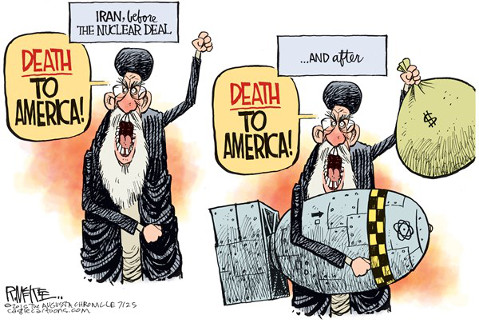Leverage over Iran’s Nukes Has Been Lost
Nuclear Deal Involves Untrustworthy Partner

The Nuclear Non-Proliferation Treaty (NPT) has been the most successful arms control treaty in history. But the recent executive agreement with Iran, the so-called “Joint Comprehensive Plan of Action,” may well destroy the NPT.
The NPT, originally ratified in 1970, has limited the spread of nuclear weapons. Under the treaty, non-nuclear-weapon states agreed to the peaceful use of nuclear technology. The five nuclear-weapon states at the time — the United States, the Soviet Union, Great Britain, France, and China — would help other nations with medical, energy, and other non-military nuclear technology. The International Atomic Energy Agency (IAEA), a United Nations organization, was responsible for monitoring treaty compliance.
Iran, as one of the 190 signatories to the NPT, has had nuclear inspection agreements with the IAEA since the 1970s. For most of that time Iran has been violating those agreements.
The most serious recent violation was in 2003, when inspectors found traces of enriched uranium (a precursor to developing nuclear weapons) at a secret Iranian research facility. Since then, Iran has continued to stonewall inspectors and accuse them of fabricating evidence.
Iran has never fully cooperated with the IAEA, and it has mocked the authority of the United Nations.
Iran has also insisted on maintaining thousands of gas centrifuges, equipment used to enrich raw uranium to make it suitable for nuclear power generation — or for nuclear weapons. Iran can obtain all the reactor fuel or medical radioisotopes it needs on the world market. The only other purpose for keeping the centrifuges is to produce “weapons grade” uranium.
The new inspection agreement negotiated with the IAEA is in many ways weaker than previous ones. Inspections must be announced in advance. If Iran protests an inspection, a mediation period of up to 24 days is allowed before the inspection occurs — ample time to remove the evidence of nuclear weapons research and development.
But the most dangerous thing about this agreement may be the damage it does to the NPT itself. The agreement negotiated by the Obama administration proves that a nation can ignore its obligations under the NPT for years without consequences. In fact, Iran has been rewarded with the promised end of economic sanctions. With the NPT now exposed as a hollow agreement, other nations — particularly Iran’s neighbors — will be both pressured and emboldened to seek their own nuclear weapons.
Olli Heinonen, a former IAEA official and an expert on Iran’s nuclear program, has said with diplomatic understatement that the new agreement is “a political agreement, not a non-proliferation agreement.” And if it leads to the nuclear arming of the Middle East, it’s hard to see how any rational political interest has been served.
The United States intended the agreement to “ensure the exclusively peaceful nature of Iran’s nuclear program.” For over 30 years that was the IAEA’s goal as well. But the IAEA failed — as we will — because Iran is not a trustworthy partner.
The Iran Task Force (a group of former government officials and nuclear and legal experts) stated the obvious last year: “The international community almost certainly has more leverage over Iran now, with most sanctions still in place, than it will have in the wake of a comprehensive agreement, after which most sanctions will be lifted or suspended. If the U.S. and its allies cannot achieve now a rigorous and robust commitment by Iran to provide full disclosure regarding its past nuclear work, and to provide full future access and transparency, it is hard to envision, and will be extremely difficult if not impossible to ensure, Iranian compliance in the future, post-sanctions environment.”
We didn’t achieve that rigorous and robust commitment. Instead we have given Iran — a brutal Islamic dictatorship that terrorizes its own people and is a threat to the rest of the world — a green light to make now, or at a time of its choosing within the next 10 years, the most terrible weapons imaginable.
Dale Francisco is a Santa Barbara city councilmember and chair of the county Republican Party.



